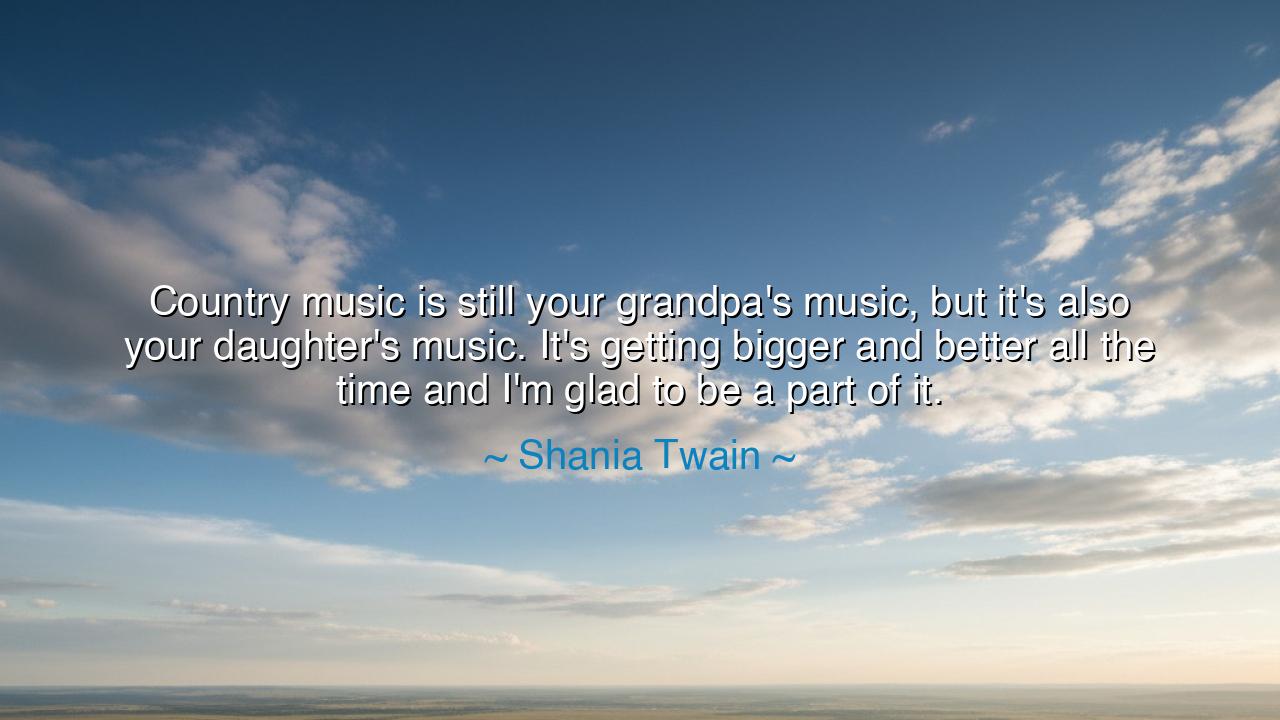
Country music is still your grandpa's music, but it's also your
Country music is still your grandpa's music, but it's also your daughter's music. It's getting bigger and better all the time and I'm glad to be a part of it.






The words of Shania Twain, “Country music is still your grandpa's music, but it's also your daughter's music. It's getting bigger and better all the time and I'm glad to be a part of it,” are more than a reflection on song and melody. They are a proclamation of the eternal spirit of art, the way it bridges the generations, binding the past with the future in a single living flame. Country music, in her vision, is not trapped in one age, nor buried in the soil of memory. It is a river, ancient yet fresh, flowing through the lives of elders and children alike, reshaping itself, yet always recognizable as the same living water.
In the voice of grandfathers, we hear the echoes of fields tilled by hand, of hardships endured under the sun, of evenings when the fiddle or guitar brought comfort after a long day’s labor. This was music born from struggle and simplicity, from barns and back porches, from the dusty trails of cowboys and the prayers of homesteaders. To the grandfathers, this music was a companion, a reminder that though life was hard, its beauty and dignity could be captured in song. They held it close, thinking it belonged to their time. Yet in Twain’s words, we see the truth: the grandfather’s song has never died, for it still beats in the heart of the young.
And now, in the laughter and footsteps of daughters, we witness the rebirth of that same song. What was once sung to soothe the weary is now sung to inspire the bold. Where once it spoke of surviving the storm, now it also sings of reaching for the stars. The daughter does not erase the voice of her elder—she expands it. She threads electric guitars and modern rhythms into the old hymns, not to replace, but to build upon them. And in doing so, she makes the music her own while still honoring those who first sang it by the fire. This is the way of living traditions: not frozen relics of history, but breathing legacies that evolve and thrive.
History itself gives us examples of such renewal. Consider the story of the Greek epics—the tales of Homer, sung by bards for centuries. In ancient times, those songs were carried by the old, passed down word by word. But in later generations, new poets and playwrights reimagined them, reshaping them into dramas for the stage, then later into inspirations for Renaissance painters, and still later into themes for films and novels. Just as country music belongs not only to the elders but also to the young, so too did Homer’s verses transcend time, growing “bigger and better,” not because they abandoned their roots, but because each age dared to make them new.
In Twain’s statement, there is also a message of humility and gratitude. She does not claim to own the music, nor to be its sole champion. Instead, she rejoices that she is “glad to be a part of it.” Here lies a great truth: no art, no tradition, no legacy belongs to one person. It is a shared fire, tended by many hands, passed from old to young, from master to student, from parent to child. The true artist is not the ruler of tradition but its servant, shaping it with their gifts and then releasing it for the next generation to carry further.
The lesson for us is clear. Whatever we inherit—be it music, culture, or wisdom—is not ours to hoard. We are but guardians and gardeners of what was given, entrusted to keep it alive, to add our labor and vision, and to hand it forward more vibrant than we received it. Just as Twain speaks of country music, so must we speak of all our inheritances: that they are ancient, yet also new, and that their greatness lies in the way they stretch across time, embracing both the old and the young.
So, let us ask ourselves: what is the song we carry? What traditions, stories, or values have been handed down to us? And more importantly, how will we shape them for the children who come after? For the world does not grow “bigger and better” by chance. It grows when each generation takes up its tools—its instruments, its words, its hands—and dares to weave the old into the new.
Therefore, I say unto you: cherish what you have received. Honor the voices of the elders, but do not be afraid to lift your own. Create, preserve, and pass on. If you are a singer, sing; if you are a writer, write; if you are a parent, tell stories to your children. Do not let the chain of memory be broken. For in doing so, you not only keep the music alive—you join the eternal chorus that binds past, present, and future, and you too will be “glad to be a part of it.”






AAdministratorAdministrator
Welcome, honored guests. Please leave a comment, we will respond soon